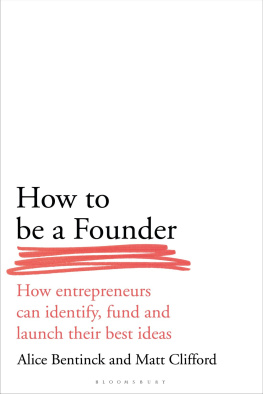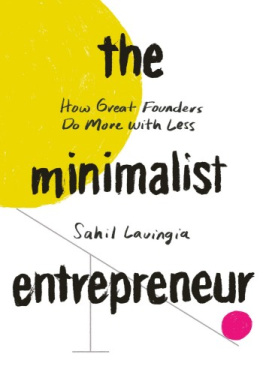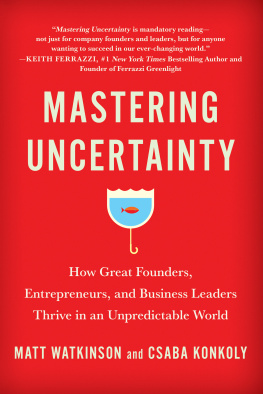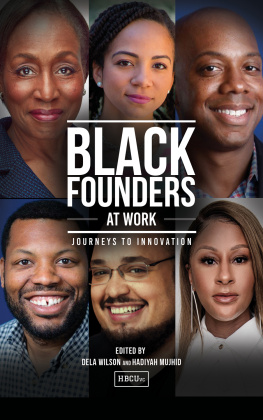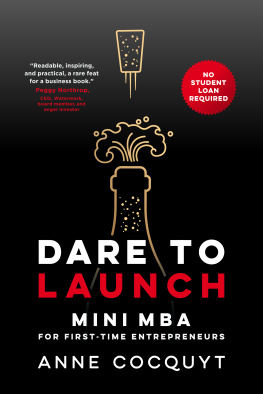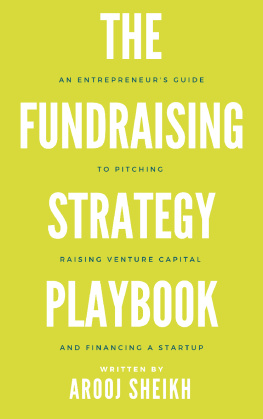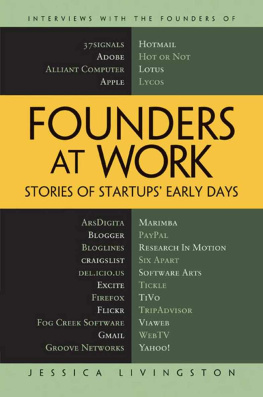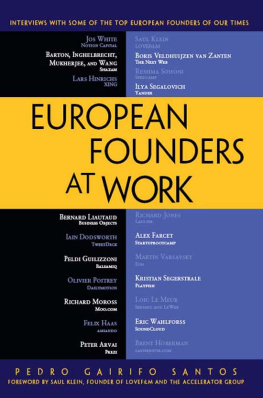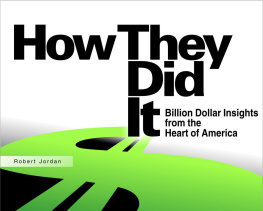
Entrepreneurship is a key engine of the modern economy. This book is the essential guide for the founders of the future who want to get started and build the enduring businesses of tomorrow.
Tony Blair, Executive Chairman of the Institute
for Global Change, and former Prime Minister
of Great Britain and Northern Ireland
Alice and Matt have created the ideal handbook for anyone considering founding a company. It provides both strategic advice on building toward a mission and purpose, plus pragmatic advice on the first 100 days. Essential reading for anyone experimenting with ideas and co-founding teams.
Sara Clemens, former COO, Twitch
In this book, Alice and Matt explain how theyve been helping some of the worlds most ambitious and talented people start companies for the last 10 years. Its a great overview of the founding journey.
Tom Blomfield, founder, Monzo
Alice and Matt have helped hundreds of founders build companies and this book distils everything theyve learned. Its a great starting point for any aspiring entrepreneur!
Taavet Hinrikus, founder, Wise

Contents
The creation of the future is important. All major institutions today whether they are companies or countries had founders. Todays problems will be solved by future companies and future products. Those new institutions will create the future jobs and the infrastructure of society.
Entrepreneurship is a critical part of how we create this future. While existing companies and institutions do provide key innovations, many more innovations are driven by entrepreneurs who see an opportunity for something new. And, as in my personal shorthand, these entrepreneurs jump off a cliff and try to assemble the aeroplane of the new company with its products and services on the way down.
Once you look at the future through this lens this telescope you realize how important founders can be. As a society, we need as many founders as possible, and we need to enable these founders to succeed.
In other words, we need to scale entrepreneurship.
Assembling that aeroplane while falling is very difficult, and we need to build the networks that enable these founders to assemble the talent and resources to build the future.
Theres a set of in-depth reasons why ongoing innovation and building new, better institutions helps keep our society healthy, happy and productive. Roughly speaking, when people believe that we will have new opportunities, that the future can be substantially better than the past and that theres a chance for more people to win in the future, these are societies that promote healthy collaboration and growth.
Founders building companies is the key part of building these new, better opportunities. In my own career, Ive been focused on using networks to create amplifying platforms for entrepreneurship. Whether its creating an ecosystem for small businesses to build online businesses (PayPal), creating new marketplaces for new kinds of travel businesses (Airbnb) or a pure professional network to help all professionals (LinkedIn) these are all examples of networks that help amplify entrepreneurs and their businesses.
My friend Toby Coppel of Mosaic Ventures knew about my efforts here, so back in 2016, he encouraged me to meet with Alice and Matt. He told me they were great founders working on an interesting platform called Entrepreneur First who were going to be visiting Silicon Valley, looking to build bridges for their portfolio companies and incubation programs.
I started out as a sceptic. I warned Toby that Silicon Valley is full of failed and irrelevant incubators; that this challenge is very difficult. Usually, incubators create an adverse selection for several good reasons. But Toby has a great eye for talent, so I agreed to meet with them.
Within an hour of meeting Alice and Matt, they had overcome my scepticism and won me over. They were taking a smart shot on goal by innovating on founder selection and geography. Many incubators target only complete teams pitching a specific project already like a pre-seed or seed investment. Instead, Entrepreneur First focused on providing a platform and a network for co-founders to come together and find a good idea. And rather than limiting itself to people who could make their way to Silicon Valley, Entrepreneur First was building out entrepreneurial ecosystems around the world, from Singapore and Bangalore to Berlin, Paris and, of course, London.
All of these cities have a deep reservoir of great technical talent, with plenty of interest in entrepreneurship, but needed an amplifying network to help launch a greater number of capable founders on an entrepreneurial journey because their existing ecosystems were seriously limited in how they support entrepreneurship.
Since that meeting, Greylock Partners and I invested in Alice and Matt, and weve seen them iterate and improve at facilitating the alchemical reaction of bringing together robust co-founders to form compelling businesses. Their OKRs (objectives and key results) focus on providing a better set of services and interactions to catalyse new founding teams.
Of course, even as Entrepreneur First continues to scale, it cant possibly launch even a tiny fraction of the worlds aspiring co-founders, which is why Im so delighted that Alice and Matt have decided to share their secrets with the world in How To Be A Founder. I hope this book will help blitzscale entrepreneurship globally.
While How To Be A Founder covers the entire entrepreneurial journey, its most groundbreaking idea is its concept of founder Edge. Not only can potential entrepreneurs use this framework to figure out their personal edge, whether it lies in their particular skills (Technical Edge), behaviours (Catalyst Edge) or areas of expertise (Market Edge), but the book also explains how and why founding teams can combine their respective edges to find their Founder-Idea Fit. When co-founders with complementary edges join forces to tackle a problem that requires their specific combination of capabilities, their impact can be amazing.
This gets to one of the subtle but very important parts of both Entrepreneur First and this book. Silicon Valley has been running an intense ecosystem of entrepreneurs creating companies for decades. There are thousands of startups; they compete intensely for everything from talent to capital to customers and revenue. Stunningly, this small geography which has less than 3.5 million people total, where only a small fraction works in the technology industry accounts for more than half of the market capitalization on the Nasdaq stock exchange.
Many lessons arise from this intense, fast-moving, competitive, cooperative and inventive ecosystem. Some of these lessons I have put in my own books such as The Alliance and Blitzscaling. But one key lesson is that founders have a much better success rate when they have co-founders. With a Steve Jobs, you have a Steve Wozniak; with a Bill Gates, you have a Paul Allen.
Today, these dynamic duos are building great companies all around the world, as a new generation of co-founders like Melanie Perkins and Cliff Obrecht in Sydney and Anthony Tan and Tan Hooi Ling in Singapore demonstrate. But the extreme importance of co-founders both for creating massively scaled companies and for increasing your chances of success is rarely covered.
The Entrepreneur First network works intensely on co-founders finding each other, matching with the right co-founders and developing a new idea together. This means that Matt and Alice have worked with many hundreds of companies and thousands of entrepreneurs and one of their unique, key strengths is matching and building co-founder relationships.
Next page
